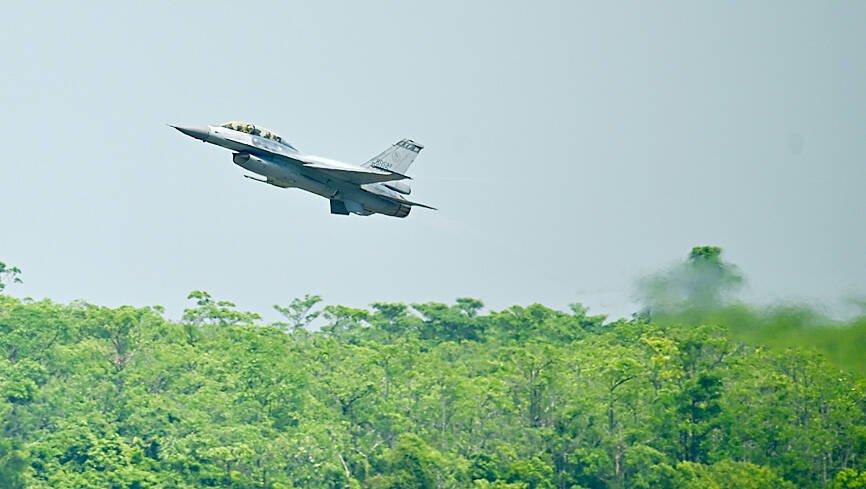The US Department of State has approved the sale of US$228 million of military goods and services to Taiwan, the US Department of Defense said on Monday.
The state department “made a determination approving a possible Foreign Military Sale” to the Taipei Economic and Cultural Representative Office in the US for “return, repair and reshipment of spare parts and related equipment,” the defense department’s Defense Security Cooperation Agency said in a news release.
Taiwan had requested the purchase of items and services which include the “return, repair and reshipment of classified and unclassified spare parts for aircraft and related equipment; US Government and contractor engineering, technical and logistics support services; and other related elements of logistics and program support,” the statement said.

Photo: Lo Pei-de, Taipei Times
“The sale is consistent with US law and policy as expressed in Public Law 96-8,” the release said, referring to the Taiwan Relations Act.
The US Congress, which is expected to approve the sale, has already been notified, the agency said.
In Taipei, the Ministry of Foreign Affairs thanked the US government for “upholding Taiwan’s safety in accordance to the Taiwan Relations Act and the ‘six assurances.’”
The Ministry of National Defense also expressed its gratitude for the approved purchase.
“The Chinese Communist Party’s normalization of gray zone intrusions are putting pressure on training space and reaction times in Taiwanese waters and airspace,” the defense ministry said in a statement.
The aviation-related goods and services “will help maintain the combat readiness and safety of various types of aircraft equipment of our air force,” it added.
It is the 16th time that US President Joe Biden’s administration has authorized the sale of military goods and services to Taiwan, the defense ministry said.
Presidential Office spokesperson Karen Kuo (郭雅慧) said in a statement that the sale reflects the importance placed by the Biden administration on peace and stability in the Taiwan Strait, and the continued implementation of US security commitments to Taiwan.
The Presidential Office backed up the defense ministry’s comment by saying that the sale would help maintain the combat readiness of the air force to deal with “normalized gray zone intrusions” by the Chinese People’s Liberation Army (PLA).
Meanwhile, a US Navy aircraft flew through the Taiwan Strait yesterday in what the US called a show of commitment to free and open international airspace, prompting China to scramble fighters.
“By operating within the Taiwan Strait in accordance with international law, the United States upholds the navigational rights and freedoms of all nations,” the US 7th Fleet said of the P-8A Poseidon’s flight.
The Eastern Theater Command of the PLA said jets were scrambled to monitor and “alert” the US aircraft.
Last week, two German navy ships sailed through the Taiwan Strait in the first such transit in two decades in a show of Berlin’s resolve to stand with Western allies over Taiwan.
Additional reporting by Reuters

ENDEAVOR MANTA: The ship is programmed to automatically return to its designated home port and would self-destruct if seized by another party The Endeavor Manta, Taiwan’s first military-specification uncrewed surface vehicle (USV) tailor-made to operate in the Taiwan Strait in a bid to bolster the nation’s asymmetric combat capabilities made its first appearance at Kaohsiung’s Singda Harbor yesterday. Taking inspiration from Ukraine’s navy, which is using USVs to force Russia’s Black Sea fleet to take shelter within its own ports, CSBC Taiwan (台灣國際造船) established a research and development unit on USVs last year, CSBC chairman Huang Cheng-hung (黃正弘) said. With the exception of the satellite guidance system and the outboard motors — which were purchased from foreign companies that were not affiliated with Chinese-funded

PERMIT REVOKED: The influencer at a news conference said the National Immigration Agency was infringing on human rights and persecuting Chinese spouses Chinese influencer “Yaya in Taiwan” (亞亞在台灣) yesterday evening voluntarily left Taiwan, despite saying yesterday morning that she had “no intention” of leaving after her residence permit was revoked over her comments on Taiwan being “unified” with China by military force. The Ministry of the Interior yesterday had said that it could forcibly deport the influencer at midnight, but was considering taking a more flexible approach and beginning procedures this morning. The influencer, whose given name is Liu Zhenya (劉振亞), departed on a 8:45pm flight from Taipei International Airport (Songshan airport) to Fuzhou, China. Liu held a news conference at the airport at 7pm,

Taiwan was ranked the fourth-safest country in the world with a score of 82.9, trailing only Andorra, the United Arab Emirates and Qatar in Numbeo’s Safety Index by Country report. Taiwan’s score improved by 0.1 points compared with last year’s mid-year report, which had Taiwan fourth with a score of 82.8. However, both scores were lower than in last year’s first review, when Taiwan scored 83.3, and are a long way from when Taiwan was named the second-safest country in the world in 2021, scoring 84.8. Taiwan ranked higher than Singapore in ninth with a score of 77.4 and Japan in 10th with

GRIDLOCK: The National Fire Agency’s Special Search and Rescue team is on standby to travel to the countries to help out with the rescue effort A powerful earthquake rocked Myanmar and neighboring Thailand yesterday, killing at least three people in Bangkok and burying dozens when a high-rise building under construction collapsed. Footage shared on social media from Myanmar’s second-largest city showed widespread destruction, raising fears that many were trapped under the rubble or killed. The magnitude 7.7 earthquake, with an epicenter near Mandalay in Myanmar, struck at midday and was followed by a strong magnitude 6.4 aftershock. The extent of death, injury and destruction — especially in Myanmar, which is embroiled in a civil war and where information is tightly controlled at the best of times —